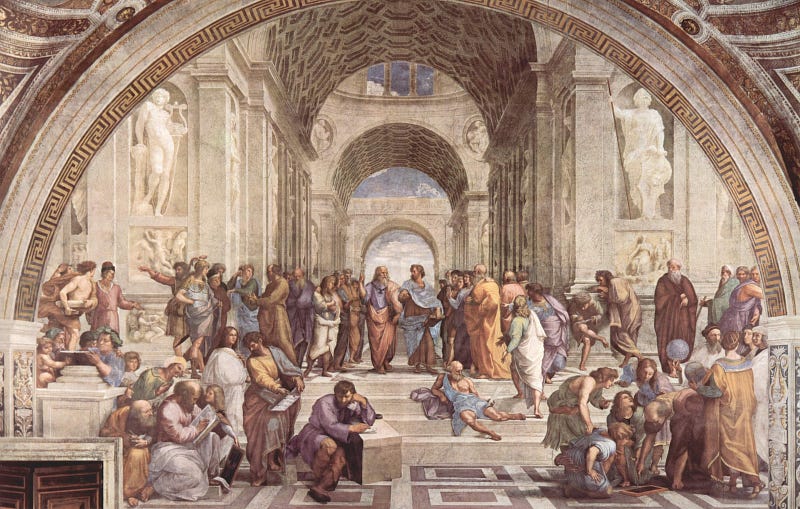The Foundations of Athenian Democracy: Solon and Cleisthenes
Written on
The Rise of Athenian Democracy
The establishment of Athenian democracy was a challenging journey, with significant contributions made by Solon, whose reforms laid the groundwork for future developments. It was under Cleisthenes that truly democratic practices took root, but these were built upon the legal foundations laid by Solon.

The invention of democracy by the Greeks, often hailed as the "best of possible systems," raises intriguing questions. How did this system emerge and endure amidst powerful monarchies like those of the Assyrians, Babylonians, Medes, and Persians? Understanding Solon's influence is key to this narrative.
The vulnerabilities of democracy were highlighted in the aftermath of totalitarian regimes in the 20th century, as well as during the turmoil of the 1960s and 70s. Democracy in Europe was perceived as fragile, often politicized and internally conflicted.
Athens stands as a remarkable example of a democracy that not only resisted the might of the Persian Empire but also efficiently created a modern state that eventually expanded into a local empire, asserting control over other Greek city-states.
Defining Democracy
The term "democracy" derives from the Greek "demokratia," meaning "power of the people," where "demos" refers to the populace. However, "demos" can imply both the entire citizenry or the masses, often contrasting with the elite, a distinction rooted in the language of the Greek aristocracy. The earliest instances of the term appear long after Athenian democracy's inception, complicating our understanding of its initial connotations.
For many subsequent generations, "democracy" evolved into a positive political term, symbolizing the power seized by the common populace from the aristocrats. The original term might have been "isonomy," meaning "equality before the law," which emphasizes the ideal of equality for all citizens and appears earlier in historical texts as a rallying cry against tyranny.
The essence of democracy lies in the political power being held by the citizenry, particularly the majority who were not part of the elite. In this system, individual wealth and lineage minimally influenced political rights.

What did democracy mean in ancient Greece?
From the 9th century BCE, city-states known as "poleis" emerged in Greece, where citizens could partake in the Assembly of the People, influencing critical community decisions such as those concerning war. Even in Homer's time, individuals of lower status had the opportunity to voice their opinions and critique the aristocracy, as illustrated by Thersites in the "Iliad."
While citizens of lower status theoretically possessed voting rights and could engage in discussions, societal norms often discouraged their participation. Thus, democracy was a system where the citizens of the polis were ideally equal, determining which rights and offices would remain with the aristocrats or wealthier citizens.
The Origins of Democracy
The features that characterize democracy did not originate solely with the Athenians. Elements of democratic governance were present in various Greek regions by the late 7th and early 6th centuries BCE, such as Chios, Megara, Heraclea Pontica, and Chalcis. The Athenians, while not the inventors of democracy, adeptly synthesized diverse foreign models, creating a more structured system through a series of sweeping reforms rather than gradual evolution.

Solon: The Architect of Reform
Born around 635 BCE into a royal lineage but without wealth, Solon engaged in trade and poetry during his youth, notably penning verses that inspired the fight for Salamis, crucial to Athens' identity. In 594/593 BCE, he became archon eponym and leveraged this role to implement transformative reforms, earning his reputation as a prominent statesman and legislator.

Legal Reforms Introduced by Solon
The roots of Athenian democracy trace back to the 6th and 5th centuries BCE, marked by influential figures such as Draco and Solon, who documented and systematized Athenian laws. Solon enacted critical legal and economic reforms:
- He prohibited the enslavement of debtors and their families.
- He abolished the debts of the peasantry and outlawed their enslavement.
- He introduced the Euboean system to facilitate foreign trade.
- He authorized the minting of new, high-silver-content coins.
- He incentivized the growth of craftsmanship.
- Solon's constitutional reforms classified citizens into four wealth-based groups, diminishing aristocratic power.
- He levied taxes on the wealthiest classes to support governmental operations.
- Political rights were tied to wealth rather than lineage.
- He broadened public participation by establishing the Council of Four Hundred.
After implementing these reforms, Solon embarked on a journey, during which the aristocracy regained dominance, paving the way for the tyrant Pisistratus. It was Cleisthenes' reforms that ultimately reestablished democracy.
The Evolution of Governance: From Homeric to Byzantine Era
The title "Basileus" (Greek: βασιλεὺς) was employed by rulers across Greek city-states and monarchies, signifying the evolution of governance from the era of Homeric heroes to Byzantine emperors.
The first video titled "Bitesize Athens: Solon's reforms and the beginning of Athenian Democracy" provides insights into Solon’s pivotal reforms and their impact on Athenian society.
The second video titled "Athenian Democracy: Solon and Cleisthenes" delves into the significant roles both figures played in shaping the democratic landscape of Athens.
A Note to My Readers
I wish to address a concern that affects many content creators, including myself, on Medium.com. Despite dedicating significant effort to crafting valuable content, the compensation often falls short. If you appreciate my work, please consider supporting me on my "Buy Me a Coffee" page. Your contributions, regardless of size, can inspire me to continue producing engaging and thought-provoking content. Thank you for being part of this journey!

